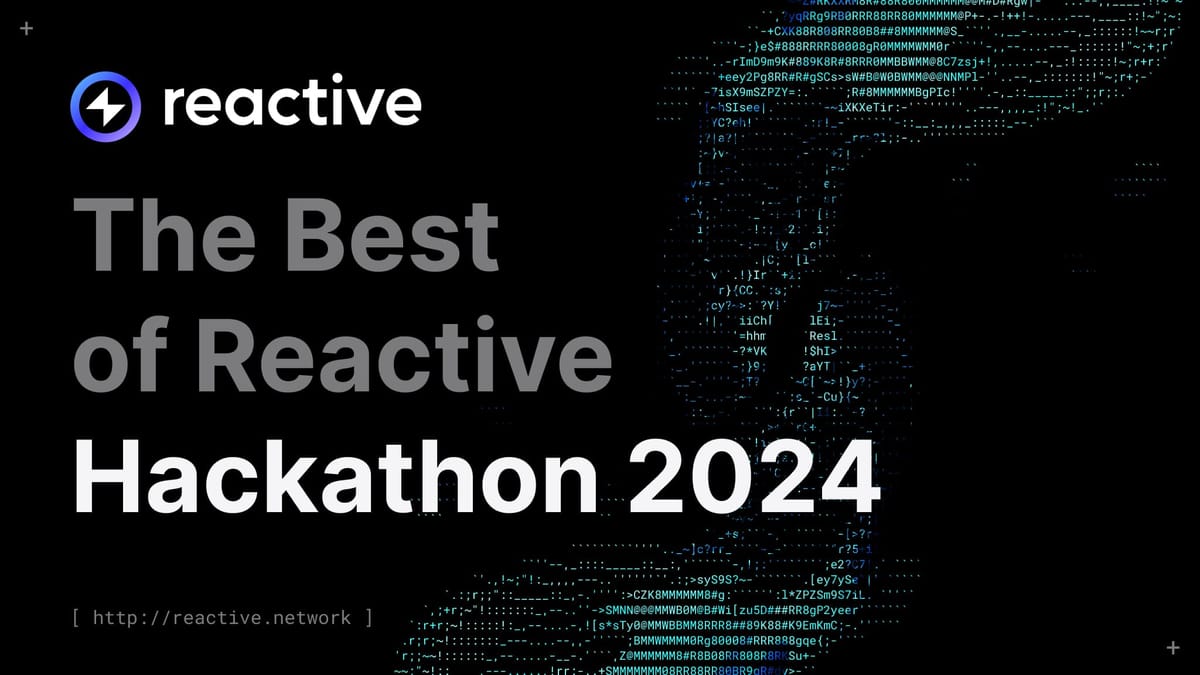The Best of Reactive Hackathon 2024
The Reactive Hackathon (9th Sept–4th Nov) showcased 74 groundbreaking projects leveraging Reactive Smart Contracts, solving real-world blockchain challenges like flash loans, NFT royalties, and cross-chain lending.

The Reactive Hackathon, held from 9th September to 4th November, brought together a global community of developers and innovators to explore the vast possibilities of Reactive Smart Contracts. Over the course of 8 weeks, we witnessed an incredible display of creativity, with 74 projects submitted and 397 hackers participating. We extend our gratitude to our esteemed judges for their time, thoughtful evaluations, and valuable feedback. Throughout the event, participants gained hands-on experience with Reactive Smart Contracts through workshops led by our Developer Relations Head, Ivan, empowering them to turn ideas into practical solutions.
Here’s an in-depth look at the winning projects and how they leveraged Reactive Network to solve real-world problems, elevate blockchain efficiency, and deliver innovative solutions.
Open Track Winners
1st Place - Non-Locking FlashLoan Protocol (5000 USDT)
Hacker: Maniveer
Problem: Traditional flash loan protocols, such as Aave, require users to lock their assets into a liquidity pool, limiting their usability. This approach prevents liquidity providers from accessing their funds for other purposes, creating inefficiencies in DeFi.
Solution: The Non-Locking FlashLoan Protocol eliminates locked liquidity by leveraging Reactive Smart Contracts (RSCs). Instead of pooling funds, users retain ownership of their assets while participating as liquidity providers. Reactive Network’s event-driven architecture ensures real-time liquidity updates and enables transactions to occur automatically in response to on-chain events.
Key Features:
- The system updates liquidity pools dynamically when users approve, transfer, or interact with tokens.
- Users maintain full control over their tokens while still earning fees.
- Flash loans are processed instantaneously without requiring locked assets, optimizing asset utilization.
Impact: This innovation redefines asset liquidity in DeFi, offering a more efficient and user-centric flash loan protocol that unlocks the full potential of assets.
2nd Place - Dynamic NFT Royalty System (2000 USDT)
Hacker: Harsh Kasana
Problem: The NFT ecosystem suffers from royalty enforcement challenges. Static royalty rates are often bypassed by marketplaces, fail to adapt to market conditions, and cannot operate effectively in cross-chain environments, leading to $1.8 billion in annual royalty losses for creators.
Solution: The Dynamic NFT Royalty System uses Reactive Smart Contracts to enforce royalty payments dynamically across chains and marketplaces. By autonomously monitoring sales and market conditions, RSCs ensure real-time royalty adjustments, transparency, and compliance.
Key Features:
- Automatically updates royalty rates based on trading volume and pricing trends.
- Tracks and enforces royalties across multiple chains.
- Provides creators with real-time visibility into their earnings.
Impact: This project revolutionizes the NFT royalty model, empowering creators with consistent revenue streams and enhancing transparency across the NFT space.
3rd Place - Flash-Profit-Extractor (1000 USDT)
1st Place - Pangolin Track (2000 USDT)
Hacker: Prakhar Srivastava
Problem: Arbitrage opportunities in DeFi require rapid execution and efficient token swapping. Traditional platforms often rely on manual approvals and static pricing, leading to inefficiencies and missed profits.
Solution: The Flash-Profit-Extractor uses RSCs to automate token swaps, optimize trading routes, and dynamically calculate prices. By leveraging real-time approvals and event-driven processes, it enables seamless arbitrage with minimal latency.
Key Features:
- Adapts to real-time market conditions to optimize profits.
- Streamlines token swapping without manual intervention.
- Executes trades based on pre-defined triggers, ensuring efficiency.
Impact: This project showcases the power of RSCs in enhancing trading efficiency and unlocking profitable arbitrage opportunities for DeFi users.
Template Deployer Track Winner
1st Place - Reactor (2000 USDT)
Hacker: Harsh Kasana
Problem: Deploying smart contracts often requires advanced technical knowledge, making blockchain automation inaccessible to many users.
Solution: Reactor simplifies the deployment and management of Reactive Smart Contracts through a template-based platform. It enables users to automate workflows across dApps and chains without writing code.
Key Features:
- Pre-built templates for various automation patterns, including cross-chain bridges and live data integration.
- Allows users to deploy RSCs with minimal effort.
- Supports advanced use cases like external dApp integration and multi-chain operations.
Impact: Reactor democratizes blockchain automation, making it accessible to developers and non-technical users alike.
No-Code Track Winners
1st Place - Crypto AutoPay (800 USDT)
Hackers: BTCAlchemist & Mattprime
Problem: Automating recurring payments in crypto remains a challenge, with existing solutions relying heavily on third-party services that are expensive and centralized.
Solution: Crypto AutoPay uses RSCs to enable fully decentralized recurring payments for subscriptions, donations, and more.
Key Features:
- Automates payments based on user-defined schedules.
- Eliminates reliance on costly external services like Gelato or Chainlink Keepers.
- Allows users to define payment frequency, amount, and recipients.
Impact: This project simplifies crypto payments for individuals and businesses, offering a secure and cost-effective solution for recurring transactions.
2nd Place - Content Verification Platform (400 USDT)
Hacker: Vagish Dilawari
Solution: This platform uses RSCs to verify content uploads asynchronously, ensuring compliance with platform standards. Its modular design allows integration with multiple verification modules.
3rd Place - Token Turnover Tracker (200 USDT)
Hacker: Aldo Lata Soba
Solution: The tracker monitors ERC-20 token transactions in real-time, providing valuable insights for investors and developers.
Bi-Weekly Challenge Winners
1st Challenge - Reactive Bridge (700 USDT)
Hacker: Salman Dev
A two-way token bridge powered by RSCs, enabling seamless cross-chain transfers with real-time updates and minimal latency.
2nd Challenge - Cross-Chain Lending (700 USDT)
Hacker: Harsh Kasana
A decentralized lending protocol allowing users to borrow assets across chains using ETH as collateral and MATIC for loans, secured by Reactive Network’s event-driven architecture.
3rd Challenge - Approval Magic (700 USDT)
Hacker: Prakhar Srivastava
An extension of the Flash-Profit-Extractor, automating token approvals for seamless arbitrage execution.
What’s Next for Reactive Network?
Promising projects from the hackathon are eligible for additional $35K grants to help scale their innovative solutions. To recognize their hard work and contributions, all hackathon participants will also receive NFT certificates as a token of appreciation and achievement.
The Reactive Hackathon demonstrated the immense potential of Reactive Smart Contracts to reshape blockchain ecosystems. By enabling automation, scalability, and cross-chain compatibility, Reactive Network empowers developers to solve real-world challenges and build the future of decentralized technology.
Stay connected as these projects evolve and new opportunities emerge!
About Reactive Network
The Reactive Network, pioneered by PARSIQ, ushers in a new wave of blockchain innovation through its Reactive Smart Contracts (RSCs). These advanced contracts can autonomously execute based on specific on-chain events, eliminating the need for off-chain computation and heralding a seamless cross-chain ecosystem vital for Web3’s growth.
Central to this breakthrough is the Inversion of Control (IoC) framework, which redefines smart contracts and decentralized applications (DApps) by imbuing them with unparalleled autonomy, efficiency, and interactivity. By marrying RSCs with IoC, Reactive Network is setting the stage for a transformative blockchain era, characterized by enhanced interoperability and the robust, user-friendly foundation Web3 demands.





